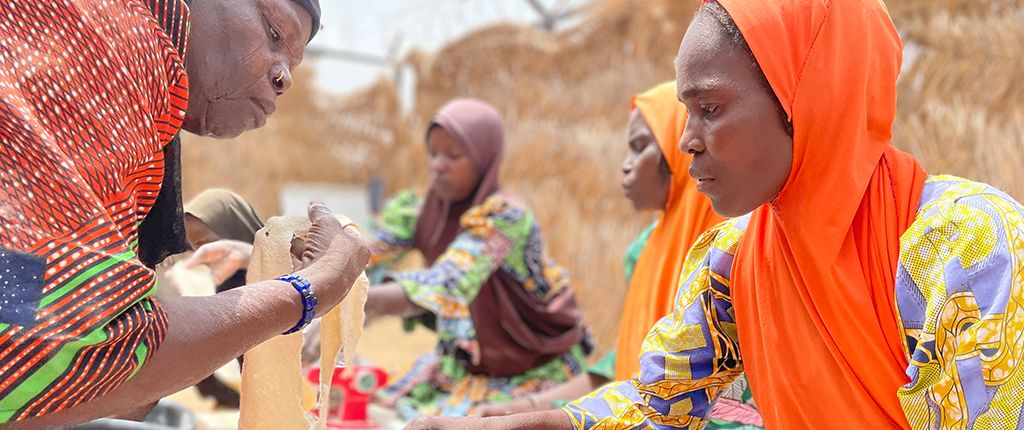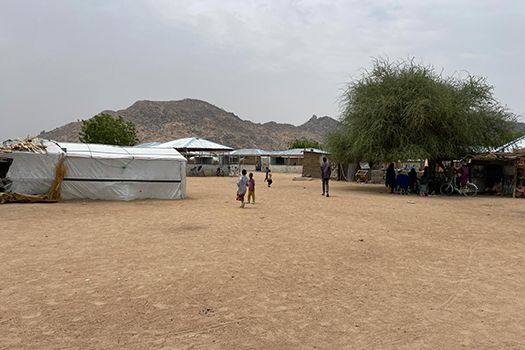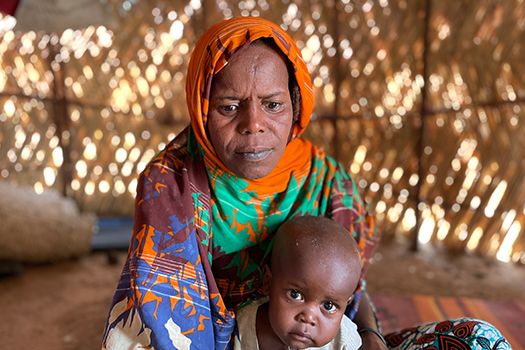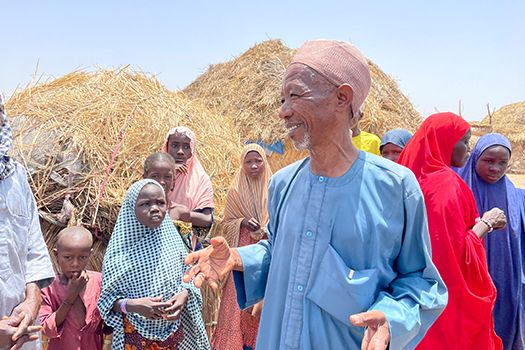
Life on the run in north-eastern Nigeria

A report by our press officer Katharina Kiecol, who visited our projects on site.
Pulka is a small town in north-eastern Nigeria, close to the border with Cameroon. The journey from Maiduguri, the capital in Borno state and our main location in Nigeria, to this small town with 40,000 inhabitants and an additional 30,000 refugees is so dangerous that I am only allowed to make the 100 km journey by a UN helicopter. The reason for this is that Islamist terrorist organizations have been tyrannizing the population in this part of Nigeria for more than ten years. From above, I look down at the shimmering heat and the barren landscape on the ground. There is hardly a tree or shrub to be seen at the moment. The average temperature here is currently around 45 degrees, and it doesn't cool down much at night either.
I'm not allowed to spend the night in Pulka, because even that is too dangerous. The risk of being kidnapped or attacked is too great. More than two million people in the north-east of the country alone have had to flee to safe places.
One of our three offices in Nigeria is based in Pulka and twelve of our 64 colleagues work here. The main aim of our work is to provide people with clean water and to create safe spaces for women and girls to find a path to a self-determined life. Locally, as in the whole of Borno State, I am only allowed to move around by car. The refugees have found shelter from the terrorists a little way away from the main artery of the small town and live in small houses made of mud, corrugated iron or plastic sheeting. Only in the camp am I allowed to move freely with my colleagues who accompany me. The Nigerian military provides protection from the terrorists' attacks.
A forced marriage that doesn't last long

This is where I meet Halinka Ummate. She is 24 years old. I can hardly imagine what she has already experienced in her short life. At the age of 13, she had to flee her village to escape the terrorists. “When Boko Haram came and killed people in my village, I ran for my life. When I came to Pulka with my mother and siblings, we lived in the bush at first. Then the soldiers came and took us to a transit camp. We came to this town with nothing. We lived in a school. Then they built accommodation for us and brought us to the new camp. My family said it was now time for me to get married and so I got married, left the camp and came to the city.” But the forced marriage didn't last long. She now has a second husband and a two-year-old daughter. During my visit, she sleeps in the small mud house with the corrugated iron roof, in front of which we sit on the floor.
“The first time I got to know Malteser International was in the camp. They came to us, built latrines, educated us about hygiene and distributed mosquito nets and many things we didn't even know about before. During the sessions in the safe spaces for women and girls, they explained to us how to take care of our bodies with sanitary towels during our periods.” Halinka also learned how to sew hats for men in the safe space. Headgear is part of traditional dress in Nigeria. Sewing them gave her the means to earn her own money, so she no longer has to ask her husband for money when she needs something.
Just a few meters away from Halinka's house is one of the two safe spaces that we have set up for women and girls in Nigeria. Eight more will be added in the coming weeks. “Women are the backbone of the family,” says Johnson Byamukama, Country Director of Malteser International in Nigeria. “If they are doing well, the rest of the family is doing well too. In the Safe Spaces, we offer them the opportunity to talk to each other, discuss their problems and questions with our staff and receive further training. The girls can just be children and play.”
Girls are jumping rope in front of the entrance, and behind the house some women produce noodles and hang them on a line to dry. Inside the house, around 50 women are sitting on the floor. Some are playing a traditional game of marbles, others are sewing, while others are chatting.
“The concept in the shelters for women and girls is the same at all locations. They should have a safe space where they can talk and learn. Men are generally not allowed in. Our male colleagues are also not allowed to enter the rooms,” explains Johnson.
Protection at Mashamari camp

Back in Maiduguri, our main base in Nigeria and the largest city in Borno State with around one million inhabitants, I make my way to one of the other refugee camps in Mashamari. It is around half an hour away from Maiduguri by car. To me, the camp looks more like a small village, as most of the houses were built by the residents themselves. There are no prefabricated containers or tents from aid organizations. Not everyone is allowed access to the camps in this region. For security reasons, the roads are only passable between 9.00 am and 3.00 pm. The many checkpoints by various authorities, such as the Nigerian military, make it clear to me that there is a constant danger.
My impression is confirmed by Hawa Bakar, who fled to the camp. She tells me that two people were shot outside the camp the day before. She doesn't give any further details. Even eight years after her escape, her family's life is only seemingly safe. “When Boko Haram attacked the village for the first time, they took all our food supplies. Then they left us empty-handed. The next time they attacked, they took children. It was clear to me then that I had to flee. When we had to leave, we took the small children on our backs and walked. I fled with my grandmother. So I arrived at the camp with my children, my grandmother and a donkey. I came alone, and my husband followed on foot, later.”
Hawa Bakar has now built up her own livelihood in Mashamari. She learned to make pasta in our Safe Space. With some money from Malteser International, she was able to buy her own pasta machine and now makes pasta which she can then sell.
Clean water is a piece of safety

But even though she has been living here with her family for eight years, she still wants to return to her home country. Just like Hassana Shueibu. The 66-year-old has been living in Mashamari for nine Ramadan, which is how he counts the years. He has a calm, friendly demeanor, but when he starts to talk about his escape, he becomes emotional. “Life has changed. We had our dignity before these 'animals' came and took everything from us. My own faith tells me to carry on, but nothing is the same as before. When the terror started, we were afraid to leave our homes because whenever someone left the village, they were slaughtered. So we decided to wait for the soldiers to come with us. I used to have 200 animals, but I lost everything. I even had someone to look after the animals. But when Boko Haram came and saw the herdsman, they killed him. When I got here, I only had a few animals left. Initially, I sold some so that I could build these houses and buy some food for us. I still have hope of returning. Malteser International has helped us a lot since we started living here. At first, we only had a simple hand pump for water, but now we have a proper well that provides us with clean and sufficient water.”
I am once again realizing how important clean water is these days. Today, on my second visit to Mashamari, I only took one bottle with me, and it was already empty by lunchtime. Right behind Hassana and his family's house is one of the wells that we have installed and which is powered by solar energy. Hassana's wife is a member of one of the so-called water committees. The volunteers make sure that the people who fetch water here line up properly and don't argue. They also make sure that the water canisters are clean so that the families don't get sick from contaminated water. As crowded as it is at this well, it is no easy task to keep an overview.
After almost 10 days, I leave Nigeria and fly back to Cologne, where I work at our headquarters. I have gathered many impressions. Once again, I have a great respect for the enthusiastic work of my colleagues, who face so many obstacles and physical hardships and yet carry out their work with passion and commitment. And, of course, I am impressed by the people we work with. Even after so many years, they never give up hope that they will one day be able to return to their homeland and live a life in peace.
(June 2024)








